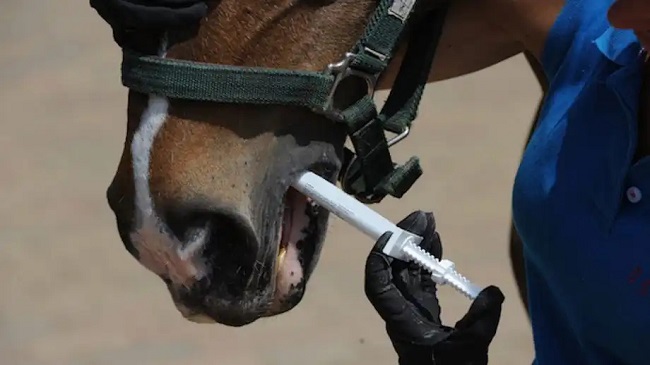
The responsibility for protecting a horse from parasites is one every horse owner faces. All horses have worms, but the good news is that worms can be kept under control with property management; manure removal, practicing good sanitation measures, bot egg removal, and keeping to a good schedule are a must. Not doing so can take a toll on a horse’s health, even resulting in death. Follow your recommended guidelines for your horse’s weight and avoid using the same product every time you worm, as the active product ingredient should be rotated.
The frequency of giving your horses worming medicine depends on how frequently they are in contact with other horses they’re not pastured with and how good their pasture management is. Horses with poor pasture management, and/or frequent contact with horses they’re not pastured with should be given worm medicine on a rotational basis every 6-8 weeks. Horses with good pasture management and little or no contact with horses they’re not pastured with may get by with being given worm medicine every 3 or 4 months on a rotational basis.
A good, safe worming program will incorporate fenbendazole, ivermectin and pyrantel pamoate on a rotation basis. A strong worming program is essential to healthy horses. A suggested schedule would include:
- January; Fenbendazol
- March: Ivermectin/ Praziquantel
- June; Pyrantel Pamoate
- September; Ivermectin
- December; Pyrantel Pamoate
Specific dates are not established as the delivery dates depends on the year and freeze/thaw occurrence. If horse owners prefer to not have their horses placed on a worming schedule, they can be omitted if quarterly fecal counts are provided from a licensed veterinarian. If you choose to use a daily wormer for better coverage, it will need to be supplemented with, at least, ivermectin (in fall, after a good freeze), as pyrantel tartrate daily wormer doesn’t kill bots. A twice-yearly course of fenbendazole, double dose according to the horse’s weight for 5 days in a row, is needed to eliminate encysted small strongyle larvae. A twice-yearly treatment with pyrantel pamoate, double dose according to horse’s weight for two days in a row, or 10 times the normal daily dose of pyrantel tartrate daily worm medicine for two days in a row, will be necessary to eliminate tapeworms. If you give a horse that has a lot of worms an effective purge type worm medicine (any commercially available worm medicine other than the daily wormer), so many worms can die at once that it can clog up the horses’ veins, heart, lungs and other parts of the body (depending on the type of worm) with dead worms and cause the horse to suffer and possibly die.
What Each Drug Does
Ivermectin
Kills everything except encysted small strongyle larvae & tapeworms.
Pyrantel (pamoate, tartrate)
Kills everything except bots & encysted small strongyle larvae. A double dose of pyrantel pamoate paste for two days in a row, dosage according to horse’s weight, is required to eliminate tapeworms.
Oxibendazole
A wide spectrum, safe and effective deformer that does not kill bots.
Fenbendazole
Kills everything except bots. A double dose according to horse’s weight for 5 days in a row is required to eliminate encysted small strongyle larvae & tapeworms.
Related Articles & Free Email Newsletter Sign Up
How Stall Cleaning Impacts Stable Air Quality
How to Train a Horse to Neck Rein




Comment here